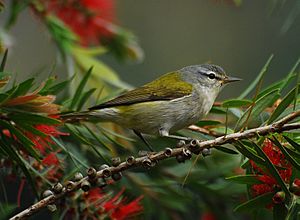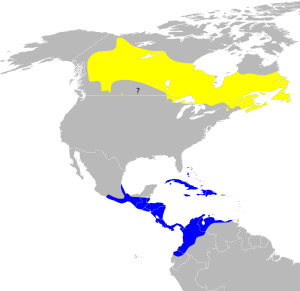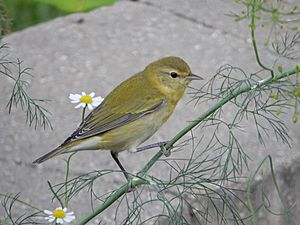Tennessee warbler facts for kids
Quick facts for kids Tennessee warbler |
|
|---|---|
 |
|
| Male in Costa Rica | |
| Conservation status | |
| Scientific classification |
|
| Kingdom: | Animalia |
| Phylum: | Chordata |
| Class: | Aves |
| Order: | Passeriformes |
| Family: | Parulidae |
| Genus: | Leiothlypis |
| Species: |
L. peregrina
|
| Binomial name | |
| Leiothlypis peregrina (A. Wilson, 1811)
|
|
 |
|
| Range of O. peregrina Breeding range Wintering range | |
| Script error: The function "autoWithCaption" does not exist. | |
| Synonyms | |
|
Helmintophila peregrina |
|
Script error: No such module "Check for conflicting parameters".
The Tennessee warbler (Leiothlypis peregrina) is a small, active bird. It is a type of New World warbler. These birds spend their summers breeding in eastern North America. When winter comes, they fly south to southern Central America, the Caribbean, and northern South America. The scientific name peregrina comes from a Latin word meaning "wanderer." This fits because these birds travel long distances!
Contents
What Does a Tennessee Warbler Look Like?
The Tennessee warbler is about 11.5 centimeters (4.5 inches) long. Its wingspan is around 19.69 centimeters (7.75 inches). This little bird weighs roughly 10 grams (0.35 ounces).
A male Tennessee warbler ready for breeding has an olive-colored back. Its shoulders, rump, and belly are also olive. The flight feathers on its wings are brownish-black. It has a slate gray neck, the top of its head (crown), and a line near its eye. Its underside is a gray-white color.
Female Tennessee warblers look similar to males. However, they are not as brightly colored. Their undersides have a bit more green. Both males and females have long wings and a short tail. They also have a thin, pointy bill. Young birds look a lot like the adult females.
Sometimes, people might confuse Tennessee warblers with other birds. For example, they look a bit like female black-throated blue warblers. But black-throated blue warblers have darker cheeks. They also have two white spots on their wings.
Another bird that looks similar is the red-eyed vireo. However, the red-eyed vireo is bigger. It also moves more slowly and sings almost all the time. The orange-crowned warbler can also look like a Tennessee warbler. But the orange-crowned warbler does not have a white eyebrow. It is also more gray-brown on top. Its feathers under its tail are yellow.
Where Do Tennessee Warblers Live?
The Tennessee warbler breeds in many parts of Canada. It also breeds in the Adirondack Mountains in New York. You can find them in northern Vermont, New Hampshire, and Maine. They also breed in northeast Minnesota and the northern part of the Upper Peninsula of Michigan.
These birds are migratory. This means they travel long distances between seasons. They spend their winters in southern Central America, the Caribbean, and northern Colombia and Venezuela. A few even fly as far south as Ecuador. Very rarely, one might even fly to western Europe!
This bird was named from a bird that was found in Tennessee. It is likely that the bird was just passing through Tennessee during its long migration journey.
Tennessee Warbler Behavior and Habits
Tennessee warblers mostly eat insects. They especially like a type of insect called the spruce budworm. The number of Tennessee warblers can change depending on how many spruce budworms there are. They also enjoy eating flower nectar, fruits, and some seeds.
Like most warblers, this bird is very quick when it is looking for food. It moves carefully along branches. You can find it searching for food at all different heights in the trees.
When it is time to build nests, the Tennessee warbler likes to be alone. But after the breeding season, they often join other types of birds in mixed groups.
Nesting and Reproduction
The Tennessee warbler prefers to live in coniferous forests. These are forests with trees like pines and spruces. They also like mixed forests that have both conifers and deciduous trees. You can also find them in young woodlands and wet, swampy areas called boreal bogs.
The female warbler builds a cup-shaped nest. She uses dried grasses and moss. Then, she lines the inside with finer grasses, small stems, and hair. The nest can be placed on the ground. Sometimes, it is built above a bog in moss. It can also be at the bottom of a small bush.
The female lays 4 to 7 eggs. The eggs are white with brown spots on them.
See also
 In Spanish: Chipe peregrino para niños
In Spanish: Chipe peregrino para niños



